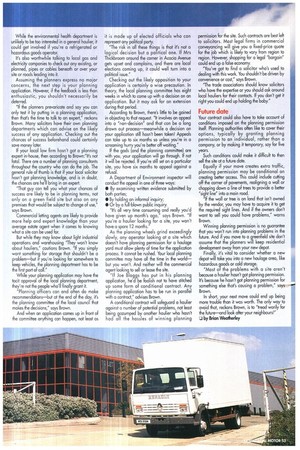According to the.pundits, birth, marriage and movtg house are the
Page 54

Page 55

If you've noticed an error in this article please click here to report it so we can fix it.
most stressful events in ahyone's life. However, moving to a new haulage depot could create even more angst than all three put together. CM offers some advice on how to make the right move.
oad hauliers have a habit of growing like topsy—at least when there isn't a recession napping at their heels. The depot that was big enough for the fleet two years ago, could now be too cramped, too congested and too dose to the neighbours.
The solution? Move to somewhere bigger. It sounds easy in theory. In practice there are two basic options for the operator wanting to move: Go for a greenfield site and build a depot to your own design; or look for existing industrial premises that can handle your office, warehousing, truck parking and vehicle maintenance requirements all in one place. Whichever option you choose, it means going out and looking—or using a commercial properly agent to look for you. Either way that process could well take many months. However, let's assume you've spotted an advertisement for a new light industrial estate that's got a plot offering warehousing space and a yard that would be ideal for your haulage operation. But can the site be used for a haulage yard? Has it got, or will it need, planning permission for use as a haulage depot? Who's got those answers? The average haulier may be tempted to go to his solicitor to start the ball rolling. But according to Ted Brown, commercial property solicitor with Leeds based law firm, Ford & Warren: "Joe Bloggs haulier can do a lot of the preliminary work himself—he really doesn't need to get professional advice first, He can make his own enquiries, starting with a four-point checklist of Planning, Highways, Drainage and Environmental Health.'
First step
The first step, says Brown, is to contact the planning department of the local council. "Obviously you've got to check first and foremost with the planners if you've got a site in mind. Assuming it's not already been refused, they'll probably also refer a haulier to the transport & highways department which will deal with things like vehicle access. You'll also need to talk to the council's mains drainage deportment to look at what effect your vehicles may have if they're moving over sewers and water pipes. If you're repairing, washing or cleaning out vehicles on the site, the planners will also want to ensure there's some kind of interceptor within the site drainage." While the environmental health department is unlikely to be too interested in a general haulier, it could get involved if you're a refrigerated or hazardous goods operator. It's also worthwhile talking to local gas and electricity companies to check out any existing, or planned, pipes or cables beneath or over your site or roads leading into it.
Assuming the planners express no major concerns, the next step is .your planning application. However, if the feedback is less than enthusiastic, you shouldn't necessarily be deterred.
"If the planners prevaricate and say you can only test it by putting in a planning application, then that's the time to talk to an expert," reckons Brown. Many solicitors have their own planning departments which can advise on the likely success of any application. Checking out the chances of success beforehand could certainly save money later. If your local law firm hasn't got a planning expert in-house, then according to Brown:"It's not fatal. There are a number of planning consultants throughout the country who can do the job. The general rule of thumb is that if your local solicitor hasn't got planning knowledge, and is in doubt, the chances are he'll bring in an expert. "That guy can tell you what your chances of success are likely to be in planning terms, not only on a green field site but also on any premises that would be subject to change of use," says Brown. Commercial letting agents are likely to provide more help and expert knowledge than your average estate agent when it comes to knowing what a site can be used for.
But while they may know about light industrial operations and warehousing 'They won't know about hauliers," cautions Brown. if you simply want something for storage that shouldn't be a problem—but if you're looking for somewhere to keep vehicles, the planning department has to be the first port of call." While your planning application may have the tacit approval of the local planning department, they're not the people who'll finally grant it. "Planning officers can and often do make recommendations—but at the end of the day, it's the planning committee of the local council that makes the decisions," says Brown. And when an application comes up in front of the committee anything can happen, not least as it is made up of elected officials who can represent any political party. "The risk in all these things is that it's not a logical decision but a political one. If Mrs Thickbroom around the corner in Acacia Avenue gets upset and complains, and there are local elections coming up, it could well turn into a political issue." Checking out the likely opposition to your application is certainly a wise precaution. In theory, the local planning committee has eight weeks in which to come up with a decision on an application. But it may ask for an extension during that period. According to Brown, there's little to be gained in objecting to that request. "It involves an appeal into a "non-decision" and that can be a long drawn out process—meanwhile a decision on your application still hasn't been taken! Appeals can take up to six months so unless you're in a screaming hurry you're better off waiting." If the gods (and the planning committee) are with you, your application will go through. IF not it will be rejected. If you're still set on a particular site, you have six months to appeal against a refusal.
A Department of Environment inspector will conduct the appeal in one of three ways: II By examining written evidence submitted by both parties; • By holding an informal inquiry; • Or by a full-blown public inquiry, "It's all very time consuming and really you'd have given up month's ago," says Brown, "If you're a haulier looking for a site, you won't have a spare 12 months." As the planning wheels grind exceedingly slowly, any operator looking at a site which doesn't have planning permission for a haulage yard must allow plenty of time for the application process. It cannot be rushed. Your local planning committee may have all the time in the world— but you won't. And neither will the commercial agent looking to sell or lease the site. "If Joe Bloggs has put in his planning application, he'd be foolish not to have stitched up some form of conditional contract. Any planning application has to be run in parallel with a contract," advises Brown.
A conditional contract will safeguard a haulier against a number of potential problems, not least being gazumped by another haulier who hasn't had all the hassles of winning planning permission for the site. Such contracts are best lek to solicitors. Most legal firms in commercial conveyancing will give you a fixed-price quote for the job which is likely to vary from region to region. However, shopping for a legal "bargain" could end up a false economy. "You've got to find a solicitor who's used to dealing with this work, You shouldn't be driven by convenience or cost," says Brown. "The trade associations should know solicitors who have the expertise or you should ask around local hauliers for their contacts. If you don't get it right you could end up holding the baby."
Future date
Your contract could also have to take account of conditions imposed on the planning permission itself. Planning authorities often like to cover their options, typically by granting planning permission to an individual, rather than a company, or by making it temporary, say for five years. Such conditions could make it difficult to then sell the site at a future date.
Equally if your move creates extra traffic, planning permission may be conditional on creating better access. This could include cutting off the corner of pavements, realigning a wall or chopping down a line of trees to provide a better "sight line" into a main road. "If the wall or tree is on land that isn't owned by the vendor, you may have to acquire it to get the required sight lines. And if the owners don't want to sell you could have problems," warns Brown.
Winning planning permission is no guarantee that you won't run into planning problems in the future. And if you move to a greenfield site don't assume that the planners will keep residential development away from your new depot. Finally, it's vital to consider whether a new depot will take you into a new haulage area, like hazardous goods or cold storage. "Most of the problems with a site aren't because a haulier hasn't got planning permission. It's because he hasn't got planning permission for something else that's causing a problem," says Brown.
In short, your next move could end up being more trouble than it was worth. The only way to avoid that, reckons Brown, is to "tread warily for the future—and look after your neighbours!"
by Brian Weatherley




















































































































































